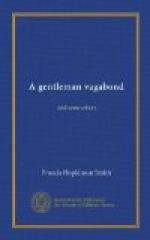The dog looked wistfully into Sanders’s face, scanning him curiously, timidly putting out his paw and dropping it, as if he had been too bold, and wanted to make some sort of a dumb apology, like a poor relation who has come to spend the day. He had never had any respectable ancestors,—none to speak of. You could see that in the coarse, shaggy hair, like a door mat; the awkward ungainly walk, the legs doubling under him; the drooping tail with bare spots down its length, suggesting past indignities. He was not a large dog—only about as high as a chair seat; he had mottled lips, too, and sharp, sawlike teeth. One ear was gone, perhaps in his puppyhood, when some one had tried to make a terrier of him and had stopped when half done. The other ear, however, was active enough for two. It would curl forward in attention like a deer’s, or start up like a rabbit’s in alarm, or lie back on his head when the girl stroked him to sleep. He was only a kickable, chasable kind of a dog,—a dog made for sounding tin pans tied to his tail and whooping boys behind.
All but his eyes! These were brown as agates, and as deep and clear. Kindly eyes that looked and thought and trusted. It was these eyes that first made the girl love him; they reminded her, strange to say, of her father’s. She saw, too, perhaps unconsciously to herself, down in their depths, something of the same hunger for sympathy that stirred her own heart—the longing for companionship. She wanted something nearer her own age to love, though she never told her father. This was a heartache she kept to herself, perhaps because she hardly understood it.
The dog and the girl became inseparable. At night he slept under her bed, reaching his head up in the gray dawn, and licking her face until she covered him up warm beside her. When the trains passed he would stand up on his hind legs, his paws on the sill, his blunt little nose against the pane, whining at the clanging bells, or barking at the great rings of steam and smoke coughed up by the engines below.
She taught him all manner of tricks. How to walk on his hind feet with a paper cap on his head, a plate in his mouth, begging. How to make believe he was dead, lying still a minute at a time, his odd ear furling nervously and his eyes snapping fun; how to carry a basket to the grocery on the corner, when she would limp out in the morning for a penny’s worth of milk or a loaf of bread, he waiting until she crossed the street, and then marching on proudly before her.
With the coming of the dog a new and happier light seemed to have brightened the shanty. Sanders himself began to feel the influence. He would play with him by the hour, holding his mouth tight, pushing back his lips so that his teeth glistened, twirling his ear. There was a third person now for him to consult and talk to. “It’ll be turrible cold at the crossin’ to-day, won’t it, Dog?” or, “Thet’s No. 23 puffin’ up in the cut: don’t yer know her bell?




